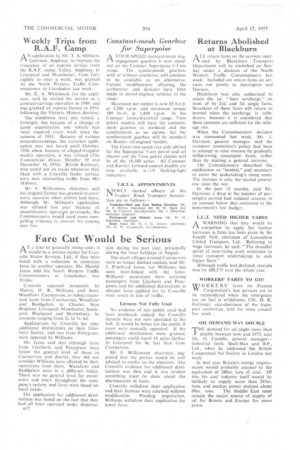Returns Abolished at Blackburn
Page 40

If you've noticed an error in this article please click here to report it so we can fix it.
A EL return fares on the services operri ated by Blackburn Transport Department will be abolished on Sunday under a decision of the North Western Traffic Commissioners last week. Included are return fares on services run jointly to Accrington and -Darwen.
Blackburn as also authorized to retain the Id. "Suez surcharge" on most of its 20. and 3d. single fares. Seventeen of these fares will return to normal when the surcharge is withdrawn. because it is considered that these amounts are sufficient for the mileage run.
When the Commissioners' decision was announced last week, Mr. J. Harrison, general manager, said the transport committee's policy had been to attempt to raise revenue by gradually withdrawing concession fares, rather than by making a general increase.
The Commissioners described the application as "modest," and necessary to cover the undertaking's rising costs. The increase is only the second general rise since the war.
In the past 12 months, said Mr. Harrison, a drop in the number of passengers carried had reduced revenue to an amount below that estimated in the department's last budget.
L.U.T. NEED HIGHER FARES AWARNING that they would he compelled to apply for further increases in fares has been given by Sir Joseph Nall, chairman of Lancashire United Transport, Ltd. Referring to wage increases, he said: "The dreadful spiral of ever-rising costs continues to force transport undertakings to seek higher fares."
Although traffic had declined, receipts rose by £88,575 over the whole year.
WORKERS' FARES TO GO?
WORKER S' fares on Preston Corporation's bus services are to be reconsidered When the emergency tax on fuel is withdrawn, Cllr. D. K. FOrester, vice-chairman of the transport committee, told the town council last week,
OIL DEMAND MAY DOUBLE
THE demand for oil might more than double between now and 1975, said Mr. II. Cunliffe, general manager— industrial fuels, Shell-Mex and B.P., Ltd., when he addressed the British Compressed Air Society in London last week.
In that year Britain's energy requirements would probably amount to the equivalent of 380m. tons of coal. Of this the coal industry itself would be unlikely to supply more than 245m. tons, and nuclear power stations about
60m. tons. The Middle East must remain the major source of supply of oil for Britain and Europe for some years.








































































































